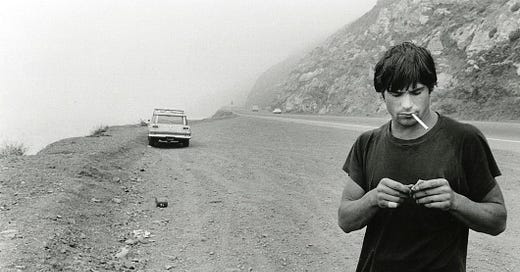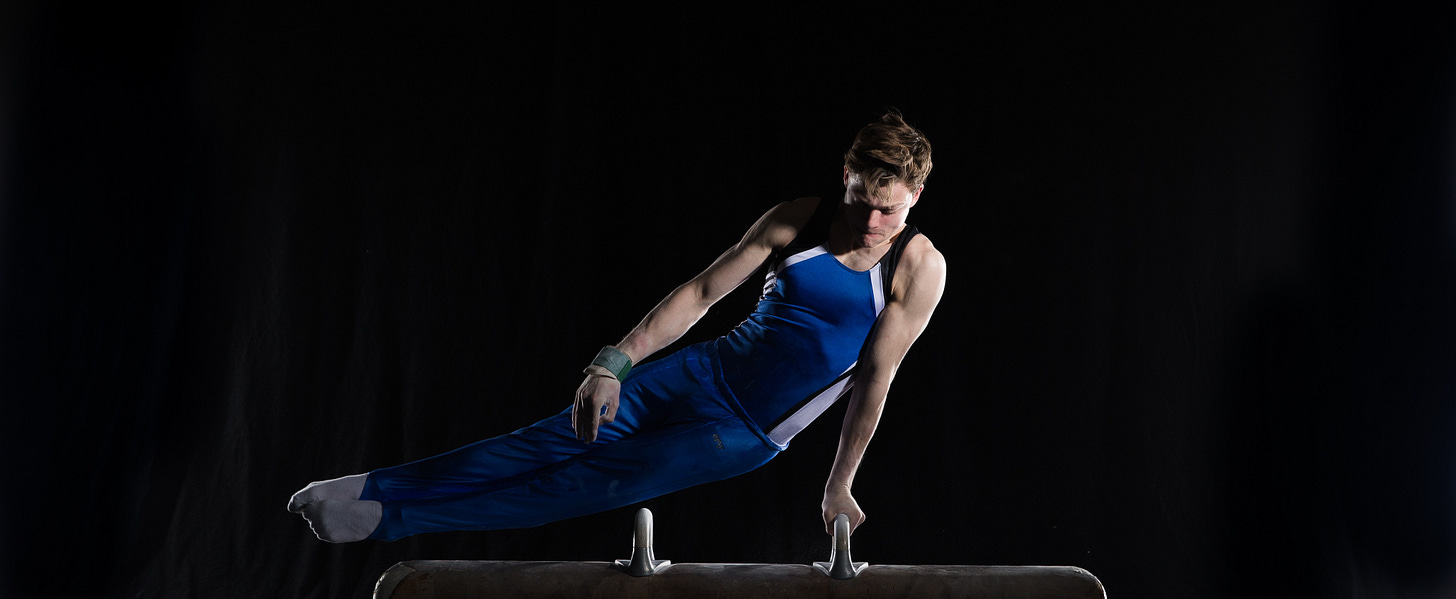Welcome back to Bluezone. This week, I’m reflecting on the impact of elite-level training I did as a kid. How it shaped not just my discipline but my entire way of seeing the world, ultimately leading me into the creative arts.
From the age of 7 to 19, I trained between 20-30 hours per week in gymnastics. Immersed in a world where fear, precision, and the pursuit of greatness defined everything. If you’ve ever dedicated yourself fully to something—be it sport, art, or a craft—how has it shaped you beyond its original purpose?
The roughness of military-style sports training is hardly apparent in its uncanniness to the eyes of the adolescents caught up in its storm. It is only after looking back that one gains a perspective that seems to place the turmoil in fragmented order. Even still, there are gaps. I remember mostly the fear which would string us all tight like a sail as our coach bellowed in rage. During the course of the tirade, you’d see flickering eyes like pinballs veer over towards our red-faced captain. A thick vein would throb like a worm on the right side of his throat. A veil of white chewing gum would pass in front of his teeth.
Fear made our lips bleed, our stomach’s tight, but it also gave us a spring of explosive power that we didn’t know we had. Fear was strung up energy that coursed through our muscles in the form of skills performed with proper technique. Fear was less scary to face than the eye-popping aggression from our coach—and for that, we were grateful.
The mythic quality of our coach extended beyond the fear we felt. If fear was purgatory, praise was Elysium. Honour is what we chased. A certain distinction in manner, a more assured gait, a swagger donned around one’s shoulders proved to us a success of ascension into an elite club. The curious mixture of dread and desire which constricted our stomachs, created a reality warp that suspended itself along the walls of the gym. When our coach spoke, his charm was neither all nor always contained where he stood, though it would assemble in that spot—or rather around it—so that the gravity with which he spoke pulled at you from beyond the border of his body. When he was your friend, he spoke with the lightest of charm, and we revelled in its fleetingness.
To us, he was the master of the world.
In the presence of a coach who treated us like metal alloys waiting to be shaped, I saw the certainty of men sure of their muscles, crumble, pulverise, powder into softness they never had. I was present at this silent transformation. I feigned calm.
The men beside me, who were actually more like boys, gave away fear in the fleeting looks they failed to hide. In such silent looks, I would decide suddenly to befriend them in favour of my previous playmates. In the faces of those I betrayed, I noticed shame, nearly softening me to relent to my actions, until a farce would come out of someone’s mouth that allowed me to smile at new ridicule. The face of the betrayed would assume the texture, almost the quality, of a block of chalk, of the powder which smeared the mats, before it would take himself for being a victim. They became a glacier, personified.
Was this what betrayal was? I had just shattered the bonds of friendship and was astonished at the agility I felt. Only the flowers seemed to notice, and I regarded them solemnly. At times when I felt completely alone in the world, the flowers rendered me homage as I passed. They’d bow without bowing, and I regarded them all without pity. They seemed somehow to be there despite the direction my feet faced, as long I kept walking in any one direction, a petal would appear to catch my fallen tear.
The rest of life flattened in its intensity compared to the sport. The closer we got to another session, the bigger the rise in our sense of perception. At such times, we saw omens in the slightest of accidents. Every small gesture was a sign of our coach’s temperament that day, hour, minute. An unplanned twitch mid-air could mean self-sabotage for the coming hours. Every true or false feeling required a poker face, a measuredness that wouldn’t rock the boat but create smoother sails for all of us.
I can still see the wincing faces of my young comrades split-faced beside me, but I also see radiant anguish. Every thigh quivered with fatigue. All of us keyed up for winning. We all had dreams of competing on the international stage. Almost none of us would make it. It was in those moments, squashed between old and young alike, that we realised that greatness took everything. The world wasn’t big enough to fit anything else than our sport—gymnastics—and the energy that it required.
Beneath that tragic ceiling, I was to cross the loveliest landscapes. In the memory of those brief moments I can describe to you jumps, breathless flights, pursuits in places of the world where I shall never go. The image for which we strived—that of Olympic success—aroused excitement that enabled us to apprehend the essence of a nation of mastery we were entering. We penetrated less into the country than into the interior of an image. Greatness was an imagined place visible only to those who had put in the work. Chalk-white smears bleach the remaining memories I hold of such persistent strife, yet the image of greatness has never once blurred in my sight. It appears in every pursuit, mission or goal, an Eden waiting to be entered.
Greatness was an imagined place visible only to those who had put in the work.
The formidableness which stains us, bruises our skin, fractures our bones and fades the way wounds heal, seems to hold fast to our spirit. After unrelenting hours chasing greatness, it leaves a mark without a trace. Sometimes, its fleetingness becomes a great tragedy, even to those who make it to the Olympic Games. Once you’ve seen greatness, you see its footsteps in all things. What’s forged by the constant marching towards greatness is not the arrival of its proof, but the character we create by its strife. The character we acquire becomes like invisible armour placed weightlessly around our core. Maybe then, greatness can be a byproduct of a full life, a life that leaves no stone unturned, a life steered with the reins fastened in your hands. Not controlling all that comes, but assured by the physicality that holds you, that you will weather honourably the storms that will come.
This essay was inspired by occurrences that have remained with me for a long time. Its form came from Jean Genet’s ‘The Thief’s Journal’. It goes without saying that I’m constantly inspired by reading writers that awaken something in me. Writings whose words seem to jump off the page and stay on you for the coming days.
With a gratitude for greatness in writing, I’d to like to mention some writers I’ve been reading on this platform who have inspired me in similar forms.
‘The Universe In Storage’ by
‘Big Dicks Ah Swingin'’ by
‘Do What You Can’t’ by
If you enjoyed this post, or the ones mentioned, show some love by leaving a like <3










Truly awesome! ❤️